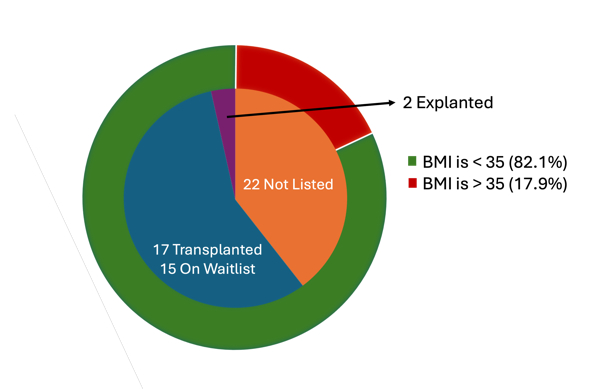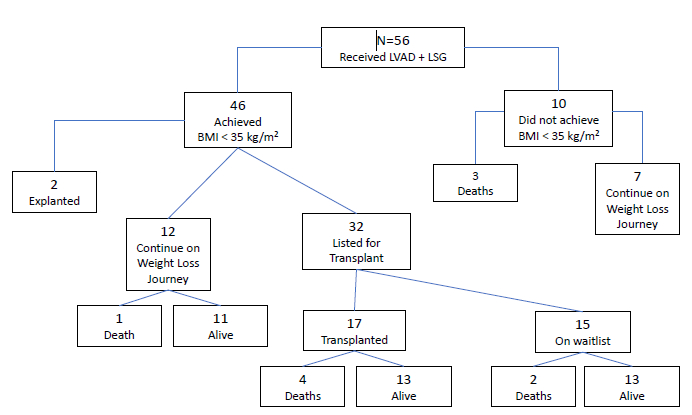Final ID: MDP955
Outcomes of Concomitant Longitudinal Sleeve Gastrectomy and Mechanical Circulatory Support in Patients with Morbid Obesity
Abstract Body (Do not enter title and authors here): Introduction/Background
Obesity and heart failure often co-exist as either a cause or effect of one another. Patients with morbid obesity have few options in terms of definitive therapies to treat heart failure. There is limited outcome data on patients with obesity and left ventricular assist devices (LVADs). Our institution has used a concomitant procedure that implants a gastric sleeve at the same time as an LVAD.
Research Question/Hypothesis
We hypothesize that the concomitant procedure enables subjects to attain transplant eligibility while limiting complications.
Goals/Aims
Analyze institutional data to identify baseline outcome statistics for the concomitant procedure.
Methods/Approach
We retrospectively reviewed records from patients with morbid obesity (body mass index > 35 kg/m2) who underwent concomitant longitudinal sleeve gastrectomy (LSG) and LVAD implantation between November 2013 and March 2022. A minimum of 2 years of follow-up data was collected. The primary endpoint was transplant listing or LVAD explantation. Secondary outcomes included mortality and related complication rates.
Results/Data
A total of 56 patients were included for analysis. The concomitant LSG and LVAD procedure has enabled 82.1% (46/56) of patients to reduce their BMI to below 35 kg/m2. Overall, 60.7% (34/56) of subjects met the primary endpoint; the median number of days to listing or explantation was 401. Thirty-two patients were listed for transplant, and 17 have been successfully transplanted. Two patients demonstrated recovery and underwent successful explant of the LVAD and remained New York Heart Association Class II at follow-up. Six subjects died before receiving a transplant, with two being listed at the time of death (Figure). Complications were noted, but they do not seem to limit the ultimate goal of transplantation.
Conclusions
A significant portion of patients who were ineligible for heart transplantation were able to reduce their BMI and become eligible. The incidence of complications for this concomitant procedure is low. Multicenter studies are needed to establish this approach as a standard of care for patients with morbid obesity and stage D heart failure.
Obesity and heart failure often co-exist as either a cause or effect of one another. Patients with morbid obesity have few options in terms of definitive therapies to treat heart failure. There is limited outcome data on patients with obesity and left ventricular assist devices (LVADs). Our institution has used a concomitant procedure that implants a gastric sleeve at the same time as an LVAD.
Research Question/Hypothesis
We hypothesize that the concomitant procedure enables subjects to attain transplant eligibility while limiting complications.
Goals/Aims
Analyze institutional data to identify baseline outcome statistics for the concomitant procedure.
Methods/Approach
We retrospectively reviewed records from patients with morbid obesity (body mass index > 35 kg/m2) who underwent concomitant longitudinal sleeve gastrectomy (LSG) and LVAD implantation between November 2013 and March 2022. A minimum of 2 years of follow-up data was collected. The primary endpoint was transplant listing or LVAD explantation. Secondary outcomes included mortality and related complication rates.
Results/Data
A total of 56 patients were included for analysis. The concomitant LSG and LVAD procedure has enabled 82.1% (46/56) of patients to reduce their BMI to below 35 kg/m2. Overall, 60.7% (34/56) of subjects met the primary endpoint; the median number of days to listing or explantation was 401. Thirty-two patients were listed for transplant, and 17 have been successfully transplanted. Two patients demonstrated recovery and underwent successful explant of the LVAD and remained New York Heart Association Class II at follow-up. Six subjects died before receiving a transplant, with two being listed at the time of death (Figure). Complications were noted, but they do not seem to limit the ultimate goal of transplantation.
Conclusions
A significant portion of patients who were ineligible for heart transplantation were able to reduce their BMI and become eligible. The incidence of complications for this concomitant procedure is low. Multicenter studies are needed to establish this approach as a standard of care for patients with morbid obesity and stage D heart failure.
More abstracts on this topic:
A Case of Right Coronary Artery Chronic Total Occlusion in a Transplanted Heart: To Stent or Not to Stent?
Krayem Hussein, Cooke Richard, Abouzaki Nayef, Kutkut Issa
Circulating Metabolomic Biomarkers of 5-Year Unintentional Weight Loss in a Biracial Community-Dwelling Older CohortYao Shanshan, Marron Megan, Miljkovic Iva, Farsijani Samaneh, Tseng George, Shah Ravi, Murthy Venkatesh, Newman Anne


